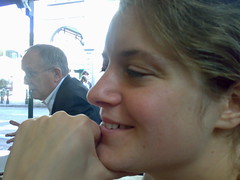
They were labelled 'Egg Mushrooms, England' on the stall, and they do indeed look quite ovular. Touch them, however, and the impression changes. Their velvety skin encloses a thick layer of gel surrounding a small firm capsule.
 The people on the stall had no idea as to what they might be, how to cook them or whether they might be palatable.
The people on the stall had no idea as to what they might be, how to cook them or whether they might be palatable. Naturally I filled a brown paper bag and set off to challenge all comers. Mostly it was just fun watching people pick them up. Their expressions would flip to bewilderment and mild disgust as they bit back the immediate reaction: "But they feel like testicles!"
I tried all my foodie friends, the manager of the Chinese restaurant where I ate that evening and the staff at Carluccio's.
There we neglected all the other customers to look the eggy mushrooms up in Carluccio's mushroom book, but to no avail.
Finally the Man (who had only heard them described over the phone) somehow came up with an identification from a website. My 'egg mushrooms' that so sensually resembled hairless testicles were the immature form of a charming fungus known as the stinkhorn, or phallus impudicus.
If left unpicked for another 24 hours, they would have sprouted into foul-smelling phalluses. Judging by the online photos, these were probably the something nasty in the woodshed that traumatised Aunt Ada Doom.
All references made it clear that the mature form was inedible, even for the least squeamish, but some half-hearted allusions were made to cultures in which the eggs are a 'delicacy'.
 Never one to shirk a challenge, I skinned them, washed off the extremely tenacious gel and sliced the surprisingly hard nubs to fry in butter. They were unpalatable to the point of being not worth eating. After four mouthfuls, I threw the rest in the bin, regretting only the waste of good butter. The mushrooms themselves had provided me with enough entertainment to more than merit the money spent on them.
Never one to shirk a challenge, I skinned them, washed off the extremely tenacious gel and sliced the surprisingly hard nubs to fry in butter. They were unpalatable to the point of being not worth eating. After four mouthfuls, I threw the rest in the bin, regretting only the waste of good butter. The mushrooms themselves had provided me with enough entertainment to more than merit the money spent on them.
